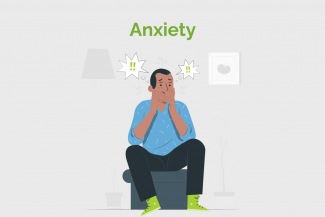
Self-diagnosis
If you think you may have an anxiety disorder, ask yourself the following questions. If you identify with several of the following signs and symptoms, and they just won’t go away, you may be suffering from an anxiety disorder and you need to consult a doctor.
- Are you constantly tense, worried or on edge?
- Does your anxiety interfere with your work, school or family responsibilities?
- Are you plagued by fears that you know are irrational, but can’t shake?
- Do you believe that something bad will happen if certain things aren’t done a certain way?
- Do you avoid everyday situations or activities because they cause you anxiety?
- Do you experience sudden, unexpected attacks of heart-pounding panic?
- Do you feel like danger and catastrophe are around every corner?
Self-help for anxiety, anxiety attacks and anxiety disorders
Not everyone who worries a lot has an anxiety disorder. You may be anxious because of an overly demanding schedule, lack of exercise or sleep, pressure at home or work, or even from too much coffee.
The bottom line is that if your lifestyle is unhealthy and stressful, you’re more likely to feel anxious, whether or not you have an anxiety disorder. So if you feel like you worry too much, take some time to evaluate how well you are caring for yourself. Ask yourself:
- Do you make time each day for relaxation and fun?
- Are you getting the emotional support you need?
- Are you taking care of your body?
- Are you overloaded with responsibilities?
- Do you ask for help when you need it?
If your stress levels are through the roof, think about how you can bring your life back into balance. There may be responsibilities you can give up, turn down, or delegate to others. If you’re feeling isolated or unsupported, find someone you trust to confide in. Just talking about your worries can make them seem less frightening. Take some of the following steps:
- Challenge negative thoughts
- Write down your worries. Keep a pad and pencil, or type on a laptop, smartphone or tablet. When you experience anxiety, write down your worries. This helps dispel negative thoughts.
- Create an anxiety worry period. Choose one or two 10 minute “worry periods” each day, time you can devote to anxiety. During your worry period, focus only on negative, anxious thoughts without trying to correct them. The rest of the day, however, is to be designated free of anxiety. When anxious thoughts come into your head during the day, write them down and “postpone” them to your worry period.
- Accept uncertainty. Unfortunately, worrying about all the things that could go wrong doesn’t make life any more predictable — it only keeps you from enjoying the good things happening in the present. Learn to accept uncertainty and not require immediate solutions to life’s problems.
When to seek professional help
While self-help coping strategies for anxiety can be very effective, if your worries, fears, or anxiety attacks have become so great that they’re causing extreme distress or disrupting your daily routine, it is important to seek professional help.
If you are experiencing a lot of physical anxiety symptoms, consider getting a medical checkup. Your doctor can check to make sure that your anxiety is not caused by a medical condition, such as a thyroid problem, hypoglycaemia or asthma. Since certain drugs and supplements can cause anxiety, your doctor will also want to know about any prescriptions, over-the-counter medications, herbal remedies and recreational drugs you are taking.
If your physician rules out a medical cause, the next step is to consult a therapist who has experience treating anxiety attacks and anxiety disorders. The therapist will work with you to determine the cause and type of your anxiety disorder and devise a course of treatment.

















